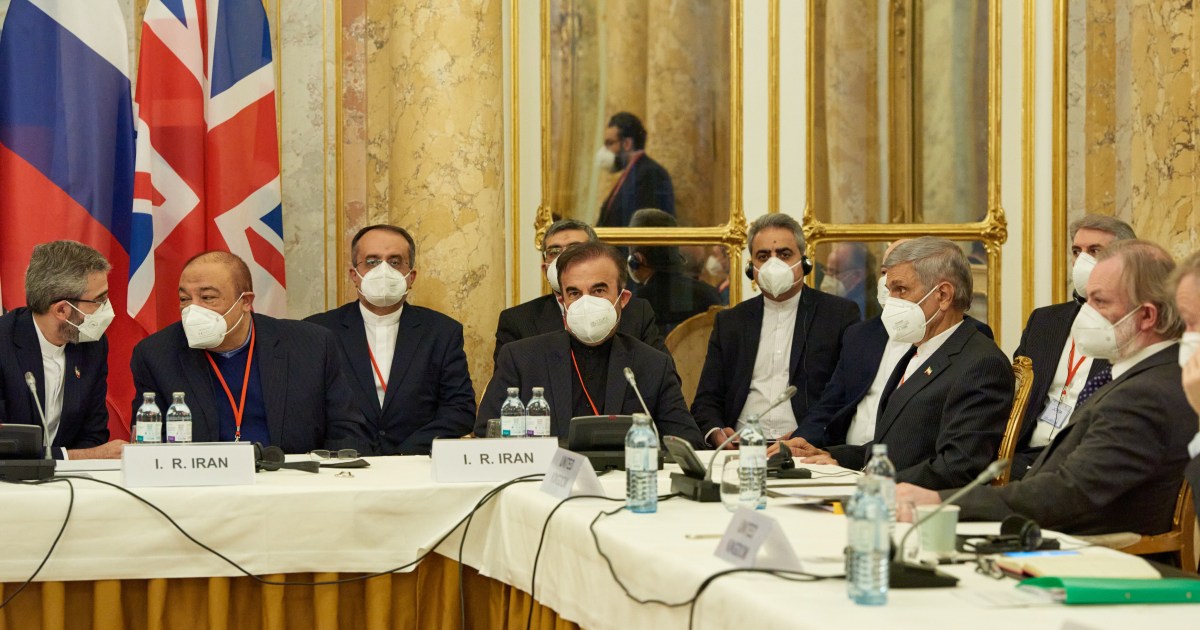The seventh round of negotiations to revive the Iranian nuclear agreement continues for the third day in the Austrian capital Vienna, amid an atmosphere of optimism spread by European statements about achieving great progress towards settling the existing differences.
The delegates gathered on Wednesday are expected to discuss Tehran's nuclear commitments under the 2015 agreement with major powers, after they discussed on Tuesday the issue of US sanctions imposed on Iran.
European diplomats stressed that the coming days would allow an assessment of the Iranians' seriousness, and expressed their hope that by the end of the week they would have a clearer picture of the negotiating track, noting the possibility of halting the negotiations in the absence of progress.
On Tuesday, a European official confirmed that 80% of the nuclear deal had been completed.
In the previous six rounds, there were similar comments about significant progress towards drafting an agreement, but talks stalled last June ahead of Iran's presidential elections without reaching a conclusion.
fair deal
In Tehran, Iranian Parliament Speaker Mohammad Baqer Qalibaf expressed today, Wednesday, his hope for lifting economic sanctions on his country through honorable negotiations, and for reaching a fair and good agreement, as he put it.
In a speech he delivered during a joint meeting of the government and parliament in the presence of President Ibrahim Raisi, the Speaker of Parliament acknowledged several problems facing his country, most notably the economy, water shortage and low population growth, stressing the need to take decisions he described as difficult and courageous to solve them.
Prior to the start of the new round of negotiations, Washington and Tehran confirmed their readiness to mutually return to the 2015 agreement, from which the administration of former US President Donald Trump withdrew in 2018, while Iran reduced its obligations.
On the sidelines of the second day's sessions, an official Iranian source told Al Jazeera that progress in the Vienna negotiations depends on providing real guarantees regarding the sanctions, and that there is no discussion of any political and security files in Vienna, and that the priority is to lift the sanctions.
Prior to that, Iran's chief negotiator Ali Baqeri expressed his optimism after the conclusion of the first session on Monday, noting that lifting all sanctions is the priority, and that reviving the agreement will be difficult if the "US policy of maximum pressure" continues.
Tehran confirmed its refusal to conclude an interim agreement in Vienna, and Iranian Foreign Minister Hossein Amir Abdollahian said on Tuesday that the main objective of the negotiations is the full and effective implementation of the agreement, and the pursuit of normalization of trade relations and economic cooperation with his country.
Negotiation path
Some issues have impeded the path of reaching an agreement during previous rounds between Iran and the West, including the dispute over the sanctions imposed on Iran after Washington withdrew from the nuclear agreement, as Iran demands the lifting of all sanctions imposed on it during the presidency of Donald Trump, while the United States says it will not lift All penalties.
Iran says that it will not back down from its nuclear steps if all sanctions are not practically lifted, and Tehran demands Washington to provide guarantees that the US administration will not withdraw from the nuclear negotiations.
For its part, Washington calls on Tehran to undo all steps that violate the nuclear agreement, including raising the level of uranium enrichment to 20% of the allowed level of 3%, and the United States refuses to lift the arms embargo on Iran.
Ensuring that the sanctions are lifted in a practical way requires measures that may take time, and this contradicts the United States' request that Iran take steps regarding its nuclear program in conjunction with the lifting of sanctions.
Israel's position
And regarding the Israeli position on a possible agreement in Vienna, Defense Minister Benny Gantz intends to go to Washington next week to discuss what Tel Aviv describes as a nuclear threat, according to the Jerusalem Post.
The Israeli concern - according to what the newspaper reported - is that the United States is studying an agreement that lifts some sanctions in exchange for Iran freezing its nuclear program.
Israeli officials warn world powers that lifting sanctions against Iran could lead to military action by Israel.
Israeli officials say that if the United States lifts sanctions on Iran, Tehran could reach the nuclear threshold within six months, at which time Israel could "take unilateral action."

